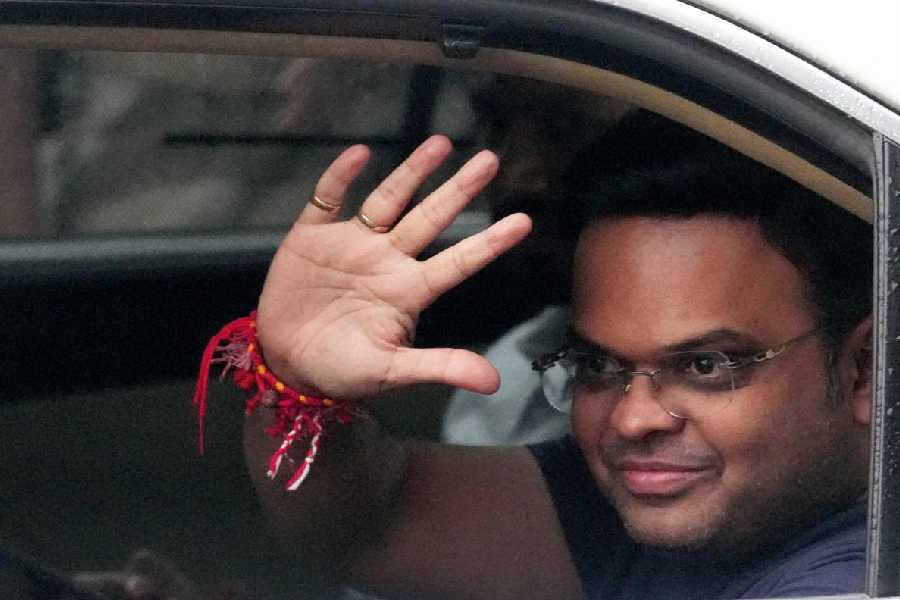Jay Shah, the Board of Control for Cricket in India (BCCI) secretary, has been elected unopposed as the next independent chair of the International Cricket Council (ICC), the world governing body announced on Tuesday.
At 35, Shah will be the youngest and the fifth Indian to head the ICC after Jagmohan Dalmiya, Sharad Pawar, N. Srinivasan and Shashank Manohar.
He takes over from New Zealand’s Greg Barclay, who earlier this month told an ICC board meeting that he would step down and won't stand for his third term of two years. Barclay first took over as the ICC chair in 2020 for two years and was re-elected in November 2022 for another two-year term.
While Shah’s ascension has been smooth, the BCCI strongman will face a lot of challenges once he assumes the chair on December 1.
His immediate task will be to renegotiate Disney Star’s four-year broadcast deal with ICC and an impending crisis awaiting the Champions Trophy in February — India’s refusal to tour Pakistan.
The ICC has already sanctioned additional funds to the tournament’s budget keeping in mind that India’s matches will follow the hybrid model whereby the matches will be in the UAE or Sri Lanka.
The ICC is aware that Pakistan could make a similar demand when India hosts the T20 World Cup in 2026. Pakistan had toured India for the 2023 ODI World Cup under the assumption that India would reciprocate their visit during the Champions Trophy.
India’s refusal this time will lead to another impasse between the cricket Boards of the two nations. As a former secretary of the BCCI, Shah will have to face the music.
The broadcast deal stand-off could be a test of his administrative skills since it will delve into the ICC’s financial health. Disney Star, the official broadcasters for global cricket events from 2024 to 2027, has been seeking relief on the overall valuation of the $US3 billion deal it signed in 2022 for TV and digital rights.
The ICC board members have already been served with a notice from Star to “blend and extend” the deal on revised terms for a longer period or a discount of over $100 million.
The broadcasters have been unhappy with several issues related to the T20 World Cup in June, including the washout of the India-Canada game in Lauderhill, Florida and the low-scoring matches in New York.
The tournament’s marketing, the nature of the pitches and the timings of the matches have come under scrutiny.
The deal was struck on the assumption that Disney Star would sell a portion of it to Zee, which was in talks for a merger with Sony. But once the merger collapsed, Zee retreated leaving Disney Star with a larger financial burden.
Since Shah already heads the ICC’s influential finance & commercial affairs (F&CA) committee — a post he will have to relinquish on assuming the chair — he is well aware of the body’s financial structure which should serve as a boon in the circumstances.
If the ICC is forced to revisit the deal and settle for a discount, it will mean a significantly lesser revenue for countries outside the Big Three — India, Australia and England.
How the ICC makes up for it will be closely monitored especially after Shah’s tenure at the BCCI was marked by a significant windfall from various sources.
The failure of the New York leg because of poor crowd attendance and below-par playing conditions have thrown up a lot of questions on the viability of cricket’s admittance at Los Angeles Olympics in 2028.
“The inclusion of our sport in the Olympics at LA 2028 represents a significant inflection point for the growth of cricket, and I am confident that it will drive the sport forward in unprecedented ways,” Shah was quoted as saying in an ICC release.
The T20 World Cup experiment has failed in the US but can the ICC afford another setback when the game returns to the sport’s biggest stage?
The winds of change are already blowing in the ICC. With head of events Chris Tetley's resignation, the search for new personnel who can "oversee strategic planning... and execution of ICC events" has started.
The proliferation of franchise leagues have already put Test cricket’s survival under threat and the ICC is contemplating a dedicated fund from 2025 in an attempt to reinforce the format.
This initiative by Cricket Australia chair Mark Baird, with the support of the BCCI and ECB, is aimed at creating a central fund to provide a minimum standard match fee ($US10,000 approximately) for the players. The initiative reportedly has the backing of Shah and as ICC chief he could take steps to increase its starting value, which is estimated at $US15 million.
This means renewed hope for the nine Test-playing nations beyond India, Australia and England when it comes to living up to the challenge of the franchise leagues.
“We must also embrace fresh thinking and innovation to elevate the love for cricket worldwide,” he said.
Expectations will be high as he embarks on a new journey in his endeavour to make cricket “more inclusive and popular”. As the BCCI secretary, he had enhanced India’s stronghold on the world stage, financially and cricketwise.
But can he live up to the promise and break barriers to encourage Test cricket to be the best of the best? Therein will lie his legacy as head of cricket’s world body.











